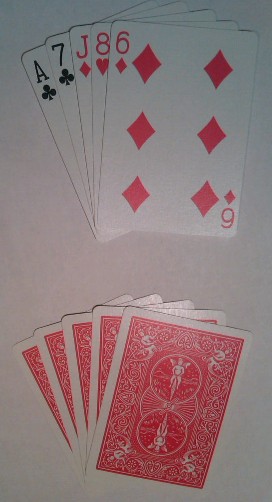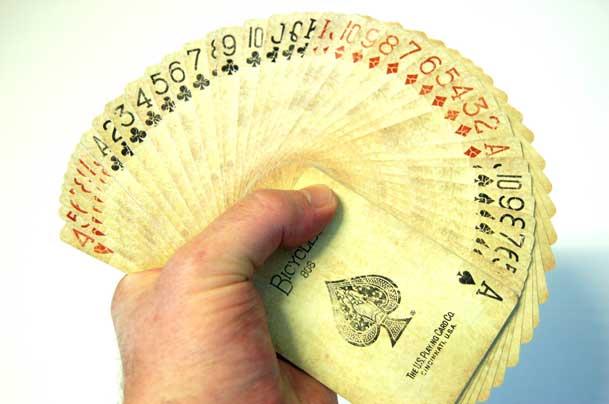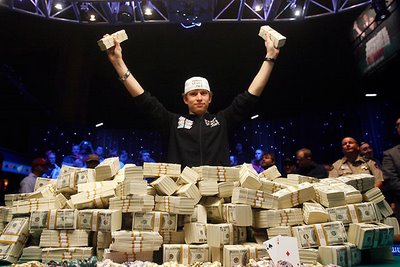The original question was: [My wife and I] always shuffle the deck at least 4-5 times before dealing. But I’m sure that’s not enough and need some guidance. Does the game previously played influence the amount of shuffling required to ensure a random deck?
But the bigger debate is that my wife prefers to deal two cards at a time so as to make the dealing go faster, while I prefer to deal the cards one at a time even though it takes longer. My preference for one card at a time is entirely based on the belief that it creates a more random distribution of cards, a cleaner deal. What is the impact of dealing one vs two cards at a time?
Can any of this be proven mathematically?
Physicist: Unless one of you is a card shark, you should be fine. The short answer is; random is random, and how you deal has no impact on that.
Starting with a perfectly ordered deck you can randomize it, about as much as you’d need, in 6-7 perfect shuffles. This is enough to get cards that start right next to each other to end up anywhere in the deck (each shuffle doubles the distance between cards). There are some subtle patterns still retained by perfect shuffles (that are unlikely to affect any game likely to be played), so if you want to avoid them you can purposely mess up a shuffle, or cut the deck at random after a shuffle or two.
The way that these patterns would be noticeable is if you play a game that completely orders the deck somehow, like klondike, in which case a series of perfect shuffles does create a fairly random deck, but it will be the same random deck every time.

A fresh pack after 7 perfect “pharaoh” shuffles. There are some patterns, but not the kind of patterns that you’d notice in most games.
The way you’d notice (assuming you’re proficient enough to shuffle perfectly, every time) is you’ll find yourself playing the same game over and over. However, adding a few genuinely random elements to a few shuffles: cutting the deck at a random location in between shuffles, not doing the shuffle perfectly, or “mixing” the cards on the table, do a really good job killing off any remotely recognizable patterns that might carry over from a previous game. But for most games, at the end of a hand/round the cards are already patternless enough that a few shuffles is more than fine. “Awesome handedness” isn’t a pattern that survives shuffling.
Once a deck has been randomized all dealing patterns are equivalent. Every set of cards is just as likely to show up as every other whether you deal one card at a time, 5 cards at a time, deal clockwise/counter-clockwise, or just deal as weirdly as possible. It’s fair to say that if someone gets 3 royal flushes in a row, it’s not because the cards are retaining a pattern. That dude’s just cheating.
In general, you can create noise from pattern, but not pattern from noise. In other words, to create patterns on purpose, you’d need to actually sort the cards by hand.

By shuffling you can sort the cards on the top, because you’ll know when to stop. But there’s no way to sort the cards on the bottom.
There are big branches of mathematics that cover this sort of thing (not cards specifically). While the patterns in the cards never quite go away completely, you can certainly say “more than good enough” or “it would take billions of games to notice anything” after not too many shuffles.
Answer gravy: If you really want to, there are ways to construct fairly artificial examples in which patterns do last from one game to the next. These are also the basis of several “trickless” card tricks. For example:
You have exactly 2N players, each with H cards in their hand, who play a round and then place their hands on the top of the deck. The dealer does exactly N pharaoh shuffles and deals again, one card at a time. If , then you’ll find that the hand that was on the very top of the deck will be dealt to the last person in the dealing order, and everyone else will end up with new cards.
So if there are 4 players, each with 5 cards, the last last hand to be put on the top of the deck will be in positions 1, 2, 3, 4, 5. The first pharaoh shuffle will move these to 2, 4, 6, 8, 10 and the second will move them to 4, 8, 12, 16, 20. When dealing;
player one gets cards 1, 5, 9, 13, 17
player two gets cards 2, 6, 10, 14, 18
player three gets cards 3, 7, 11, 15, 19
player four get cards 4, 8, 12, 16, 20 (the last hand from the previous game)
However, this “trick”, and pretty much every other, is defeated immediately by having someone cut the deck. Also, don’t ever play cards with Magicians, they think about this stuff more than you might suspect.









11 Responses to Q: Does how you deal cards affect how random they are?